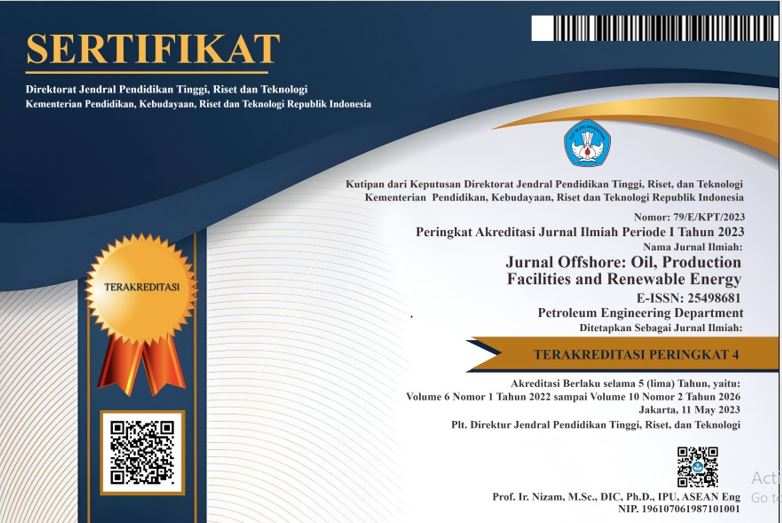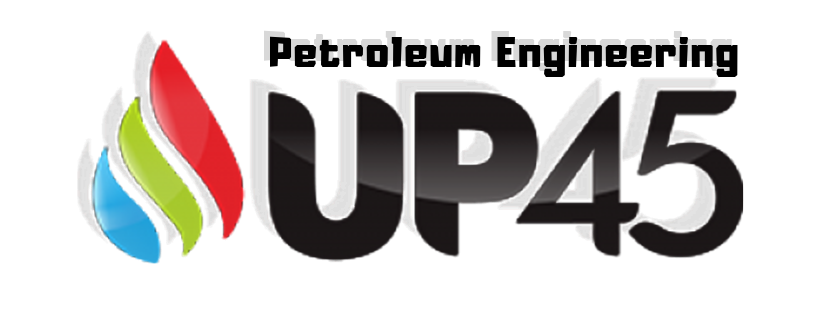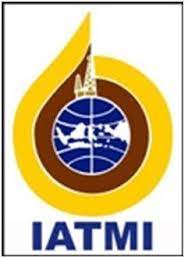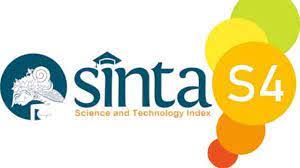A Review of Strategies for Managing Uncertainty in Crude Oil Prices by Indonesian Oil and Gas Companies and the Government
(1) Industrial Engineering, Universitas Sarjanawiyata Tamansiswa
(2) Industrial Engineering, Universitas Sarjanawiyata Tamansiswa
(3) Industrial Engineering, Universitas Sarjanawiyata Tamansiswa
(4) Petroleum Engineering, Universitas Proklamasi 45
(5) Petroleum Engineering, Universitas Proklamasi 45
(6) Management, Sekolah Tinggi Ilmu Ekonomi Widya Wiwaha
(7) Management, Sekolah Tinggi Ilmu Ekonomi Widya Wiwaha
(*) Corresponding Author
Abstract
Keywords
Full Text:
PDFReferences
Achakulwisut, P., Erickson, P., & Koplow, D. (2021). Effect of subsidies and regulatory exemptions on 2020–2030 oil and gas production and profits in the United States. Environmental Research Letters, 16(8), 084023. https://doi.org/10.1088/1748-9326/ac0a10
Acquah-Andoh, E., Putra, H. A., Ifelebuegu, A. O., & Owusu, A. (2019). Coalbed methane development in Indonesia: Design and economic analysis of upstream petroleum fiscal policy. Energy Policy, 131, 155–167. https://doi.org/10.1016/j.enpol.2019.04.035
Adeyinka, T., & Aron, D. (2018, August 6). Review of Fiscal Incentives on the Development of the Domestic Gas Market in Nigeria. SPE Nigeria Annual International Conference and Exhibition. https://doi.org/10.2118/193480-MS
Álvarez, G. C., Jara, R. M. J., Julián, J. R. R., & Bielsa, J. I. G. (2021). Study of the effects on employment of public aid to renewable energy sources. Revista Procesos de Mercado, 13–70. https://doi.org/10.52195/pm.v7i1.280
Araujo, F. C., & Leoneti, A. B. (2019). How attractive is Brazil’s oil and gas regulatory framework to investors? The Extractive Industries and Society, 6(3), 906–914. https://doi.org/10.1016/j.exis.2019.05.009
Arif, M., & al Senani, A. M. (2020, November 9). Digitalization in Oil and Gas Industry - A Case Study of a Fully Smart Field in United Arab Emirates. The Abu Dhabi International Petroleum Exhibition & Conference. https://doi.org/10.2118/203461-MS
Aritonang, P. P. (2020). Analysis on the effectiveness of “unbundling” and “open access” in Indonesian gas business sector. Jurnal Hukum & Pembangunan, 49(4), 990. https://doi.org/10.21143/jhp.vol49.no4.2354
Balashova, A. D., & Bolshakova, O. I. (2019). Influence of business digitalization on the oil recovery factor and improving the efficiency of the oil and gas companies activity. Vestnik Universiteta, 5, 73–79. https://doi.org/10.26425/1816-4277-2019-5-73-79
Biygautane, M., Hodge, G., & Gerber, P. (2018). The Prospect of Infrastructure Public-Private Partnerships in Kuwait, Saudi Arabia, and Qatar: Transforming Challenges into Opportunities. Thunderbird International Business Review, 60(3), 329–346. https://doi.org/10.1002/tie.21853
Bobylev, Y., Kaukin, A., & Miller, E. (2020). Current State and Prospects for the World Oil Market. Monitoring of Russia’s Economic Outlook, Moscow IEP.(7), 27–33.
Cao, H., Guo, L., & Zhang, L. (2020). Does oil price uncertainty affect renewable energy firms’ investment? Evidence from listed firms in China. Finance Research Letters, 33, 101205. https://doi.org/10.1016/j.frl.2019.06.003
Cao, H., Sun, P., & Guo, L. (2020). The Asymmetric Effect of Oil Price Uncertainty on Corporate Investment in China: Evidence From Listed Renewable Energy Companies. Frontiers in Energy Research, 8. https://doi.org/10.3389/fenrg.2020.00047
Cheng, D., Shi, X., Yu, J., & Zhang, D. (2019). How does the Chinese economy react to uncertainty in international crude oil prices? International Review of Economics & Finance, 64, 147–164. https://doi.org/10.1016/j.iref.2019.05.008
Corbet, S., Hou, Y. (Greg), Hu, Y., & Oxley, L. (2021). Volatility spillovers during market supply shocks: The case of negative oil prices. Resources Policy, 74, 102357. https://doi.org/10.1016/j.resourpol.2021.102357
D. Barrows, S., Blomkvist, M., Dimic, N., & Vulanovic, M. (2020). Product Market Uncertainty and M&A Activity: Evidence from the Oil and Gas Sector. SSRN Electronic Journal. https://doi.org/10.2139/ssrn.3607776
Daryanto, W. M., & Samidi, S. (2018). A Financial Ratio Analysis of Oil and Gas Private Company in Indonesia: Before and After Declining the Oil Production. International Journal of Business Studies, 2(2), 74–83. https://doi.org/10.32924/ijbs.v2i2.55
Djaja, A. R. (2021). Bankruptcy Prediction for Oil and Gas Companies in Indonesia Using Z-Score Method. Proceedings of the 5th Global Conference on Business, Management and Entrepreneurship (GCBME 2020). https://doi.org/10.2991/aebmr.k.210831.026
Dong, X., Dong, W., & Lv, X. (2020). Impact of environmental policy on investment efficiency: Evidence from the oil and gas sector in Canada. Journal of Cleaner Production, 252, 119758. https://doi.org/10.1016/j.jclepro.2019.119758
Drogovoz, P. A., & Kharin, N. I. (2021). The economic benefits of digitalization in the oil and gas industry. Finance and Credit, 27(3), 672–692. https://doi.org/10.24891/fc.27.3.672
Du, W., & Li, M. (2019). Government support and innovation for new energy firms in China. Applied Economics, 51(25), 2754–2763. https://doi.org/10.1080/00036846.2018.1558356
Duffield, C., Hui, F. K. P., & Wilson, S. (2019). 3. Funding and Financing Infrastructure: Indonesia and Australia. In Infrastructure Investment in Indonesia (pp. 53–84). Open Book Publishers. https://doi.org/10.11647/OBP.0189.03
Elichev, V., & Muñoz, E. (2018, October 15). Case Study of Digital Oilfield Implementation in the Southern North Sea. SPE Russian Petroleum Technology Conference. https://doi.org/10.2118/191596-18RPTC-MS
Firwan Aprizal, M., Juanda, B., Ratnawati, A., & Muin, A. (2021). Econometric Model for Indonesian Fiscal and Monetary Policies in Oil & Gas Sector. Studies of Applied Economics, 39(10). https://doi.org/10.25115/eea.v39i10.6018
Gidigbi, M., Bello, K., & Babarinde, G. (2019). Petroleum subsidy and its impact on tax revenue volatility. The Review of Finance and Banking, 11(1), 24–36. https://doi.org/10.17632/CBB825G3R7.2
Gorbunova, E. (2019). Improving the Government’s Tax Policy in the Oil Industry Taxation. In Global Economics and Management: Transition to Economy 4.0 (pp. 235–242). https://doi.org/10.1007/978-3-030-26284-6_21
Hajizadeh, Y. (2019). Machine learning in oil and gas; a SWOT analysis approach. Journal of Petroleum Science and Engineering, 176, 661–663. https://doi.org/10.1016/j.petrol.2019.01.113
Hartono, W. (2022). Proposed Marketing Strategy to Fight Market Uncertainty for Indonesia Paper Company. International Journal of Current Science Research and Review, 05(05). https://doi.org/10.47191/ijcsrr/V5-i5-16
Hassen, G., & Hamdi, K. (2022). Nexus between oil price uncertainty and corporate social responsibility: evidence from US firms. Journal of Economic Studies, 49(6), 1017–1032. https://doi.org/10.1108/JES-04-2021-0201
Hsiao, C. Y.-L., Lin, W., Wei, X., Yan, G., Li, S., & Sheng, N. (2019). The Impact of International Oil Prices on the Stock Price Fluctuations of China’s Renewable Energy Enterprises. Energies, 12(24), 4630. https://doi.org/10.3390/en12244630
Ichsan, M., Lockwood, M., & Ramadhani, M. (2022). National oil companies and fossil fuel subsidy regimes in transition: The case of Indonesia. The Extractive Industries and Society, 11, 101104. https://doi.org/10.1016/j.exis.2022.101104
Jacobs, T. (2021). What To Expect When You’re Expecting Robots. Journal of Petroleum Technology, 73(08), 22–29. https://doi.org/10.2118/0821-0022-JPT
Jain, A. K. (2018). A fine balance: Lessons from India’s experience with petroleum subsidy reforms. Energy Policy, 119, 242–249. https://doi.org/10.1016/j.enpol.2018.04.050
Jarboui, S., Ghorbel, A., & Jeribi, A. (2022). Efficiency of U.S. Oil and Gas Companies toward Energy Policies. Gases, 2(2), 61–73. https://doi.org/10.3390/gases2020004
Kazanin, A. G. (2020). Trends and Prospects of Development of the Oil and Gas Sector in the Context of Digitalization. Economics and Management, 26(1), 35–45. https://doi.org/10.35854/1998-1627-2020-1-35-45
Kazeem, B. L. O., & Oyelakun, O. B. (2020). Nexus Between Government Policies and Oil Sector Performance: Evidence from Nigeria. International Journal of Academic Information Systems Research (IJAISR), 4(6), 12–29. http://ijeais.org/wp-content/uploads/2020/6/IJAISR200603.pdf
Kolovrat, M., Jukić, L., & Sedlar, D. K. (2021). Comparison of Hydrocarbon Fiscal Regimes of Some European Oil and Gas Producers and Perspectives for Improvement in the Republic of Croatia. Energies, 14(16), 5056. https://doi.org/10.3390/en14165056
Kraal, D. (2019). Petroleum industry tax incentives and energy policy implications: A comparison between Australia, Malaysia, Indonesia and Papua New Guinea. Energy Policy, 126, 212–222. https://doi.org/10.1016/j.enpol.2018.11.011
Kuklina, E. A. (2021). Digital Transformation Strategy as a Tool for Implementing the Business Strategy of a Company in the Oil and Gas Sector of Modern Russia. Administrative Consulting, 6, 40–53. https://doi.org/10.22394/1726-1139-2021-6-40-53
Le, T.-H., Le, A. T., & Le, H.-C. (2021). The historic oil price fluctuation during the Covid-19 pandemic: What are the causes? Research in International Business and Finance, 58, 101489. https://doi.org/10.1016/j.ribaf.2021.101489
Lee, D.-M., Jung, S.-Y., & Lim, J.-S. (2021). Analysis of Trends of New and Renewable Energy Businesses in Global Oil and Gas Companies. Journal of the Korean Society of Mineral and Energy Resources Engineers, 58(4), 341–352. https://doi.org/10.32390/ksmer.2021.58.4.341
Li, S., & Wang, H. (2018). Traditional Literature Review and Research Synthesis. In The Palgrave Handbook of Applied Linguistics Research Methodology (pp. 123–144). Palgrave Macmillan UK. https://doi.org/10.1057/978-1-137-59900-1_6
Liu, M., Liu, L., Xu, S., Du, M., Liu, X., & Zhang, Y. (2019). The Influences of Government Subsidies on Performance of New Energy Firms: A Firm Heterogeneity Perspective. Sustainability, 11(17), 4518. https://doi.org/10.3390/su11174518
Liu, Z., Guo, J., Wang, S., & Liu, H. (2018). Government incentive strategies and private capital participation in China’s Shale gas development. Applied Economics, 50(1), 51–64. https://doi.org/10.1080/00036846.2017.1313953
Luo, Z., Yang, K., Cen, K., Pan, H., He, J., & Han, T. (2018). A study on the application of public–private partnership mode in shale gas development industry in China. Journal of Renewable and Sustainable Energy, 10(4), 045902. https://doi.org/10.1063/1.4985945
Maghyereh, A., & Abdoh, H. (2020). Asymmetric effects of oil price uncertainty on corporate investment. Energy Economics, 86, 104622. https://doi.org/10.1016/j.eneco.2019.104622
Mardawiyah Daryanto, W., & Nurfadilah, D. (2018). Financial Performance Analysis Before and After the Decline in Oil Production: Case Study in Indonesian Oil and Gas Industry. International Journal of Engineering & Technology, 7(3.21), 10. https://doi.org/10.14419/ijet.v7i3.21.17085
Mardawiyah Daryanto, W., & Primadona, A. (2018). Capital Budgeting Model and Sensitivity Analysis of the Conventional Oil Production Sharing Contract (PSC) Fiscal Systems: Empirical Evidence from Indonesia. International Journal of Engineering & Technology, 7(3.21), 5. https://doi.org/10.14419/ijet.v7i3.21.17084
Mario, C. C., Pramana, H., Eviany, A., Nugrahanto, A., Nasrudin, N., & Murtani, A. S. (2021, October 4). Automation & Digitalization Implementation – A New Normal in Oil & Gas Industry: A Success Story. SPE/IATMI Asia Pacific Oil & Gas Conference and Exhibition. https://doi.org/10.2118/205675-MS
McDonald, B., Decker, J., Johnson, B., & Allen, M. (2019). You Don’t Always Get What You Want: The Effect of Financial Incentives on State Fiscal Health. SSRN Electronic Journal. https://doi.org/10.2139/ssrn.3376991
Muarofah, S., & Falianty, T. A. (2020). The Investment of Upstream Oil and Gas in Indonesia. Jejak, 13(1), 203–217. https://doi.org/10.15294/jejak.v13i1.23248
Mursalina, M., Masbar, R., & Suriani, S. (2022). Impact of Covid-19 Pandemic on Economic Growth of the Tourism Sector in Indonesia. International Journal of Quantitative Research and Modeling, 3(1), 18–28. https://doi.org/10.46336/ijqrm.v3i1.261
Newell, R. G., & Raimi, D. (2018a). US state and local oil and gas revenue sources and uses. Energy Policy, 112, 12–18. https://doi.org/10.1016/j.enpol.2017.10.002
Newell, R. G., & Raimi, D. (2018b). The fiscal impacts of increased U.S. oil and gas development on local governments. Energy Policy, 117, 14–24. https://doi.org/10.1016/j.enpol.2018.02.042
Nwosi-Anele, A. S., Adeogun, O., & Iledare, O. (2018, August 6). Analysis of Government and Contractor Take Statistics in the Proposed Petroleum Industry Fiscal Bill. SPE Nigeria Annual International Conference and Exhibition. https://doi.org/10.2118/193470-MS
Obiri, K. A., Bjeirmi, B., & Boateng, P. (2019). Local Content Implementation Enhancement through Infrastructure Development in Ghana’s Oil and Gas Industry. Journal of Energy Research and Reviews, 1–10. https://doi.org/10.9734/jenrr/2019/v3i430106
Omodero, C. O., & Ehikioya, B. I. (2020). Oil and Non-Oil Revenues Assessment of Contributions to Infrastructural Development in Nigeria. Journal of Management Information and Decision Sciences, 23(5), 638–648. https://www.proquest.com/docview/2516963490
Paulette, B., & Denise, S. (2021). A Critical Review of the Guyana EIA Process for the Emerging Oil and Gas Sector. Advances in Environmental Studies, 5(1). https://doi.org/10.36959/742/238
Pirani, S. (2022). Assessing the Relationship Between OPEC Convergence and Oil Market Balance. Petroleum Business Review, 6(1), 43–52. https://pbr.put.ac.ir/article_142300.html
Ruiz Estrada, M. A., Park, D., Tahir, M., & Khan, A. (2020). Simulations of US-Iran war and its impact on global oil price behavior. Borsa Istanbul Review, 20(1), 1–12. https://doi.org/10.1016/j.bir.2019.11.002
Rulandari, N., Rusli, B., Mirna, R., Nurmantu, S., & Setiawan, M. I. (2018). Valuation of Production Sharing Contract Cost Recovery Vs Gross Split in Earth Oil and Gas Cooperation Contracts in Indonesia and The Aspect of Public Service. Journal of Physics: Conference Series, 1114, 012132. https://doi.org/10.1088/1742-6596/1114/1/012132
Santoso, Y. N. (2019). The Transnational Role of Foreign Companies in the Upstream Sector of Oil and Gas in Indonesia: pre-Gross Split Mechanism. Global South Review, 1(1), 63. https://doi.org/10.22146/globalsouth.34484
Semkova, D. N., & Babayev, E. N. (2020). Analysis of the Current State and Prospects of Implementation of the Public-Private Partnership Mechanism in the Oil and Gas Industry of the Russian Federation and the Republic of Azerbaijan. Administrative Consulting, 9, 145–149. https://doi.org/10.22394/1726-1139-2020-9-145-159
Sharma, S. S., Phan, D. H. B., & Iyke, B. (2019). Do oil prices predict Indonesian macroeconomy? Economic Modelling, 82, 2–12. https://doi.org/10.1016/j.econmod.2019.08.008
Shigaev, A. (2021). Scenario Forecasts of Ecosystem Development in the Oil and Gas Industry in the Context of Digitalization. IOP Conference Series: Earth and Environmental Science, 666(6), 062069. https://doi.org/10.1088/1755- 1315/666/6/062069
Sidortsov, R. (2019). Benefits over risks: A case study of government support of energy development in the Russian North. Energy Policy, 129, 132–138. https://doi.org/10.1016/j.enpol.2019.01.067
Smith, K. K., & Haggerty, J. H. (2020). Exploitable ambiguities & the unruliness of natural resource dependence: Public infrastructure in North Dakota’s Bakken shale formation. Journal of Rural Studies, 80, 13–22. https://doi.org/10.1016/j.jrurstud.2020.05.006
Subadi, S. (2021). Land Procurement for Upstream Oil and Gas Business Activities in Indonesia. Brawijaya Law Journal, 8(1), 36–53. https://doi.org/10.21776/ub.blj.2021.008.01.03
Sujatmoko, E., Yuniza, M. E., -, D., Ariadji, T., Mardiana, R., -, I., & Butar, F. B. (2020). The simplification of Upstream Oil and Gas Business license in Indonesia. Research, Society and Development, 9(2), e16921950. https://doi.org/10.33448/rsd-v9i2.1950
Surya, B., Hernita, H., Salim, A., Suriani, S., Perwira, I., Yulia, Y., Ruslan, M., & Yunus, K. (2022). Travel-Business Stagnation and SME Business Turbulence in the Tourism Sector in the Era of the COVID-19 Pandemic. Sustainability, 14(4), 2380. https://doi.org/10.3390/su14042380
Tan, X., Geng, Y., Vivian, A., & Wang, X. (2021). Measuring risk spillovers between oil and clean energy stocks: Evidence from a systematic framework. Resources Policy, 74, 102406. https://doi.org/10.1016/j.resourpol.2021.102406
Taqwa, A. (2019). Higher Education Role in Supporting Indonesian Government Policy in Developing Renewable Energy. Journal of Physics: Conference Series, 1167, 012010. https://doi.org/10.1088/1742- 6596/1167/1/012010
Taufiq, A. F. (2022). Pemberian Insentif Pajak Kepada Investor Di Industri Minyak Dan Gas Bumi Dalam Sektor Eksplorasi. Jurnal Nasional Pengelolaan Energi MigasZoom, 4(1). https://doi.org/10.37525/mz/2022-1/332
Turkeeva, K. A., & Suleimenova, A. Sh. (2021). Factors and conditions of transformation of the world oil market. Economics: The Strategy and Practice, 16(2), 71–85. https://doi.org/10.51176/1997-9967-2021-2-71-85
Turner, M., Prasojo, E., & Sumarwono, R. (2022). The challenge of reforming big bureaucracy in Indonesia. Policy Studies, 43(2), 333–351. https://doi.org/10.1080/01442872.2019.1708301
Vakulchuk, R., Chan, H.-Y., Kresnawan, M. R., Merdekawati, M., Overland, I., Sagbakken, H. F., Suryadi, B., Utama, N. A., & Yurnaidi, Z. (2020). Indonesia: How to Boost Investment in Renewable Energy. Norwegian Institute of International Affairs (NUPI). https://www.jstor.org/stable/resrep26573
Vătavu, S., Lobonț, O.-R., Para, I., & Pelin, A. (2018). Addressing oil price changes through business profitability in oil and gas industry in the United Kingdom. PLOS ONE, 13(6), e0199100. https://doi.org/10.1371/journal.pone.0199100
Wan Ahmad, W. N. K., Rezaei, J., Sadaghiani, S., & Tavasszy, L. A. (2017). Evaluation of the external forces affecting the sustainability of oil and gas supply chain using Best Worst Method. Journal of Cleaner Production, 153, 242–252. https://doi.org/10.1016/j.jclepro.2017.03.166
Wang, Y., & Zhang, Y. (2020). Do state subsidies increase corporate environmental spending? International Review of Financial Analysis, 72, 101592. https://doi.org/10.1016/j.irfa.2020.101592
Wicaksana, K. S., Ramadhan, R. F., Sujaka, M. ’Azza, & Prasojo, A. S. A. ayubi. (2022). The Effect of the Russia-Ukraine Crisis on Price Fluctuations and Trade in Energy Sector in Indonesia. Jurnal Nasional Pengelolaan Energi MigasZoom, 4(1), 6–18. https://doi.org/10.37525/mz/2022-1/345
WTI Crude Oil. (2022). WTI Crude Oil Prices - 10 Year Daily Chart. Nacrotrends.Net. https://www.macrotrends.net/2516/wti-crude-oil-prices-10-year-daily-chart
Yaw Boahen, K., & Oppong, R. (2020, August 11). Assessment of Natural Gas Infrastructure Development in Ghana. SPE Nigeria Annual International Conference and Exhibition. https://doi.org/10.2118/203778-MS
Yeshtayeva, A. A., & Dabyltaeva, N. E. (2021). Current State of the World Oil Market. Журнал “Статистика, Учет и Аудит,” 80(1), 48–53. https://doi.org/10.51579/1563-2415.2021-1.08
Yun, P., Jia, L., Jie Xin, Y., du Fen, S., Yu Wen, C., Hong Wei, L., Zhaozhe, & Feng, G. (2020). Indonesia’s New Petroleum Fiscal Regime: Fiscal Changes, Impacts and Future Trends. IOP Conference Series: Earth and Environmental Science, 446(5), 052078. https://doi.org/10.1088/1755-1315/446/5/052078
Zhang, Y., Clark, A., Rupp, J. A., & Graham, J. D. (2020). How do incentives influence local public support for the siting of shale gas projects in China? Journal of Risk Research, 23(3), 330–348. https://doi.org/10.1080/13669877.2019.1569096
DOI: https://doi.org/10.30588/jo.v6i2.1449
Article Metrics
Abstract view : 781 timesPDF - 86 times
Refbacks
- There are currently no refbacks.
Copyright (c) 2023 Syamsul Ma'arif, Dyah Ari Susanti, Dian Tiara Rezalti, Aisyah Indah Irmaya, Lia Yunita, Dila Damayanti, Yunita Fitri Wahyuningtyas

This work is licensed under a Creative Commons Attribution 4.0 International License.




.jpg)










.png)